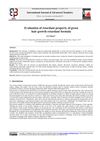 1 citations,
October 2023 in “Indian dermatology online journal”
1 citations,
October 2023 in “Indian dermatology online journal” Many people use home remedies for skin conditions, but there's limited scientific evidence to support their effectiveness.
 1 citations,
February 2023 in “Drug Design Development and Therapy”
1 citations,
February 2023 in “Drug Design Development and Therapy” Plant adaptogens may help treat skin diseases and improve skin health, but more research is needed to fully understand how they work.
January 2025 in “Pharmaceuticals” Nanocarriers can improve antioxidant delivery to the skin but face safety and production challenges.

Plant-based compounds can improve wound dressings and skin medication delivery.
 37 citations,
January 2019 in “Dermatologic Therapy”
37 citations,
January 2019 in “Dermatologic Therapy” A dietary supplement with Boswellia serrata, Curcuma longa, and Vitis vinifera showed potential improvement in hair health for telogen effluvium patients, but more research is needed.
27 citations,
February 2021 in “Clinical and Experimental Dermatology” Curcuma species improve skin health but need more research for best use.
2 citations,
April 2020 in “International journal of research in pharmaceutical sciences” Using Malaysian medicinal plants in cosmetics can treat skin and hair issues with fewer side effects than synthetic products.
 January 2024 in “AIP conference proceedings”
January 2024 in “AIP conference proceedings” Medicinal plant-based hydrogel films are promising for diabetic wound dressings.
48 citations,
March 2005 in “PubMed” Some plant-based compounds might help control the growth of new blood vessels if further research confirms their effectiveness.
 May 2019 in “International journal of advanced chemistry”
May 2019 in “International journal of advanced chemistry” The green cream safely slowed hair growth by 25%.
 June 2014 in “Basic & Clinical Pharmacology & Toxicology”
June 2014 in “Basic & Clinical Pharmacology & Toxicology” Some plant extracts may treat livestock diseases, certain animal treatments are safe and effective, but more research on drug safety and resistance is needed.
 68 citations,
March 2019 in “Advanced Healthcare Materials”
68 citations,
March 2019 in “Advanced Healthcare Materials” Advanced hydrogel systems with therapeutic agents could greatly improve acute and chronic wound treatment.
 61 citations,
September 2010 in “Fitoterapia”
61 citations,
September 2010 in “Fitoterapia” Extracts from Tridax procumbens L. have strong anti-inflammatory and antioxidant effects and block inflammation-causing enzymes.
 59 citations,
August 2014 in “International Journal of Biological Macromolecules”
59 citations,
August 2014 in “International Journal of Biological Macromolecules” The study found an efficient method to extract antioxidants from Hibiscus leaves.
 49 citations,
July 2021 in “Nutrients”
49 citations,
July 2021 in “Nutrients” Eating healthy, exercising, and taking certain supplements can help manage Polycystic Ovary Syndrome symptoms.
 39 citations,
September 2016 in “Expert Opinion on Drug Delivery”
39 citations,
September 2016 in “Expert Opinion on Drug Delivery” New drug delivery methods can make natural compounds more effective and stable.
 36 citations,
September 2019 in “Journal of Herbal Medicine”
36 citations,
September 2019 in “Journal of Herbal Medicine” Herbal nano-formulations show potential for effective skin delivery but need more research.
 31 citations,
February 2021 in “Nutrients”
31 citations,
February 2021 in “Nutrients” Curcumin may improve blood sugar levels and cholesterol in people with PCOS, but more research is needed.
 31 citations,
October 2020 in “Journal of nanomaterials”
31 citations,
October 2020 in “Journal of nanomaterials” Silver nanoparticles made from Grewia optiva leaf extract show strong antibacterial, antioxidant, and hair growth benefits.
 25 citations,
March 2018 in “Clinics in Dermatology”
25 citations,
March 2018 in “Clinics in Dermatology” Indigenous herbal medicines in the Indian subcontinent have potential for drug development but need more research and standardization.
 21 citations,
July 2017 in “Journal of Cosmetic and Laser Therapy”
21 citations,
July 2017 in “Journal of Cosmetic and Laser Therapy” Vesicular carriers like liposomes may improve cosmetic skin treatment delivery and effectiveness but need more human research.
 12 citations,
December 2012 in “Current Drug Targets”
12 citations,
December 2012 in “Current Drug Targets” The Androgen Receptor could be a target for treating diseases like cancer, but more research is needed to confirm the effectiveness of potential treatments.
 12 citations,
January 2007 in “Acta dermato-venereologica”
12 citations,
January 2007 in “Acta dermato-venereologica” Europe needs a clear system to watch over cosmetics for safety and to make sure product claims are true.
 9 citations,
November 2019 in “Scientific reports”
9 citations,
November 2019 in “Scientific reports” The AC 2 peptide from Trapa japonica fruit helps protect hair cells and may treat hair loss.
 9 citations,
July 2018 in “Current Pharmaceutical Design”
9 citations,
July 2018 in “Current Pharmaceutical Design” HO-1 helps skin health and healing but can worsen melanoma; it's a potential treatment target for skin diseases.
 6 citations,
October 2017
6 citations,
October 2017 Indian Gooseberry has potential for cancer prevention and treatment and promotes hair growth.
 3 citations,
June 2022 in “Dermatology and therapy”
3 citations,
June 2022 in “Dermatology and therapy” A new botanical treatment improved hair growth and symptoms in lichen planopilaris patients.
 2 citations,
April 2022 in “Clinical, cosmetic and investigational dermatology”
2 citations,
April 2022 in “Clinical, cosmetic and investigational dermatology” A new plant-based treatment was effective for hair regrowth in women with a specific type of hair loss that didn't respond to usual treatments.
 2 citations,
January 2018 in “Elsevier eBooks”
2 citations,
January 2018 in “Elsevier eBooks” Lipid nanoparticles improve drug delivery through the skin, offering stability, controlled release, and better compatibility with skin.
 1 citations,
December 2023 in “Annals of Phytomedicine An International Journal”
1 citations,
December 2023 in “Annals of Phytomedicine An International Journal” Nanoemulgel improves delivery and effectiveness of plant-based drugs for various conditions.


























